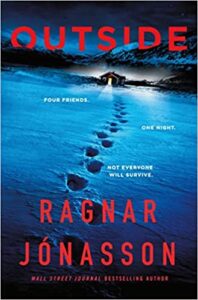I know, I know, this is a monthly column, but sometimes your whole team gets Covid and you get a little behind on monthly columns, okay? Rather than just skip the June releases, I thought I’d combine June and July’s excellent releases for a double dose of fiction in translation. These books are fresh, fascinating, and Noir AF.

Javier Cercas, Even the Darkest Night
Translated by Anne McLean
(Knopf)
Javier Cercas is one of the most brilliant and creative writers living today, and Even the Darkest Night is one of his best yet. A Barcelona detective heads into the countryside to solve a double murder; both the murders and the detective are not what they seem to be, as strange occurrences and secret histories begin to pervade the investigation.

Ragnar Jónasson, Outside
Translated by Victoria Cribb
(Minotaur)
Ragnar Jonasson is one of a rising generation of new Scandi noir, and in this, his new stand-alone, he proves he doesn’t need a series character to craft a compelling narrative. In the midst of a snowstorm, four friends taking shelter in a lodge far from civilization discover they are not alone—and the key to saving themselves lies in their worst memories.

Seishi Yokomizo, Death on Gokumon Island
Translated by Louise Heal Kawai
(Pushkin Vertigo)
Seishi Yokomizo was the king of the locked-room mystery, and there’s nothing more cut off than an island. In Death on Gokumon Island, Yokomizo’s ode to And Then There Were None, a weathy family’s scion dies while returning home after the war, and his sisters are declared next to be in danger by a mysterious letter. As tensions rise between rich and poor, mainlander and islander, so to rises the body count.

Salvador Elizondo, Secret Crypt
Translated by Joshua Pollock
(Dalkey Archive Press)
Secret Crypt is not exactly a crime novel, or even a conspiracy novel, but moreso a linguistic experiment that just happens to feature crimes and conspiracies, in which the mystery is language itself. The translator’s note warns us against seeking a plot in these pages, but what a wild ride this 1968 novel is, and with the preface of Joshua Pollock to guide you, you’ll be well-armed to interpret the text, or at least, know when to stop trying to find meaning and just enjoy the craziness instead. As people in my life often tell me, “Don’t overthink it.”

Erika Kobayashi, Trinity, Trinity, Trinity
Translated by Brian Bergstrom
(Astra House)
Three generations of women experience an alternate reality 2020 Tokyo Olympics in this fascinating and difficult to describe speculative thriller. Elderly people in Japan are being possessed by the essence of radiation, which has a personality and is quite pissed off.

Concita de Gregorio, The Missing Word
Translated by Clarissa Botsford
(Europa)
“Looking back, I think that in this story everyone has always behaved with the best intentions: even when their actions were incomprehensible and vicious, their intention at the time was always to make things better. Isn’t that awful?”
Here is the story of The Missing Word: a woman and her husband part ways. Her ex takes the children. The children never return, disappeared forever, and the ex commits suicide. Based on real case, the novel explores the spaces that only fiction can fill out from the horrors of fact. Gorgeously written and utterly devastating.

Maurizio de Giovanni, Bread for the Bastards of Pizzofalcone
Translated by Antony Shugaar
(Europa)
The murder of a popular baker sparks outrage and soon involves the local mafia in the latest Bastards of Pizzofalcone novel from Italian crime writer Maurizio de Giovanni (bet you didn’t expect this one to be about literal bread, didya?). The Bastards of Pizzofalcone—a police unit so named because of their long history of being off their game and on the take—are still on the long path to reform in this latest in the series, but everyone’s favorite cheerfully corrupt unit may be at an advantage in this one when it comes to securing practical results.

Riku Onda, Fish Swimming in Dappled Sunlight
Translated by Alison Watts
(Bitter Lemon Press)
Riku Onda’s novel The Aosawa Murders established the author as a major international talent, and now Fish Swimming in Dappled Sunlight cements that reputation with one of the twistiest psychological thrillers of the year. There are two alternating narrators in this novel. We meet them as they are about to move out of a shared apartment, preparing to hash things out before parting ways forever. The two narrators—roommates? lovers? family?—went on a disastrous trip the year before, and now they are finally ready to look back on their hike in the mountains and compare memories to figure out what exactly happened, and who to blame for the way things went down. Riku Onda is astonishingly good at the gradual reveal, and the dollops of information she doles out are sure to keep you turning the pages (but slowly, so you don’t miss anything).

Lina Wolff, Carnality
Translated by Frank Perry
(Other Press)
Carnality is getting rave reviews according to our sister site Book Marks, and given the intriguing plot set-up and obvious quality of the book, it’s no surprise that critics are in love with this surreal noir. In a nested narrative, a writer seeking inspiration heads to Spain, where she meets a man in a bar who she promises to shelter for a few days, as long as he’s willing to tell a long and bizarre story detailing the narrator’s adventures in the city’s underworld.*
*The first version of this post was corrected to reflect that the author is sheltering the storyteller, not the other way around.

















